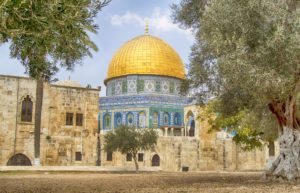
Share this Blog
Share
The First 10 Days of Dhul Hijjah
The First 10 Days of Dhul Hijjah
Commentary of Surah Al-Fajr, Ayah 2
Some commentators, like Mujahid and ` Ikramah, refer this to the dawn of ‘the Day of Sacrifice’ on the tenth of Dhul Hijjah. A narration from Sayyidna Ibn ` Abbas ؓ concurs with this view. The reason for this specification is that according to Islamic principles, Allah has made a night to precede the day. All days are preceded by their respective nights, except the ‘the Day of Sacrifice’, because the night that precedes the Day of Sacrifice is not the night of Sacrifice. In fact, the preceding night, according to Shari’ah, is the night of ` Arafah. Staying at ` Arafat is the most important and foremost rite of Hajj. If a pilgrim is not able to reach ` Arafat on the 9th of Dhul Hijjah, any time in the day or in the night following it to halt there for a while, he will not be considered to have performed Hajj at all. However if he arrives there any time during the night before the break of dawn on the 10th of Dhul Hijjah, his halt in ` Arafah will be acceptable and his Hajj will be considered valid. This shows that the day of ` Arafah has two nights, one preceding it, and another following it. The Day of Sacrifice [ 10th of Dhul Hijjah ] has no night. From this point of view, the dawn of the day of Sacrifice, among all the days of the year, occupies a special position. [ Qurtubi ].مَا مِنْ أَيَّامِ الدُّنْيَا أَيَّامٌ، أَحَبُّ إِلَى اللَّهِ سُبْحَانَهُ أَنْ يُتَعَبَّدَ لَهُ فِيهَا، مِنْ أَيَّامِ الْعَشْرِ. وَإِنَّ صِيَامَ يَوْمٍ فِيهَا لَيَعْدِلُ صِيَامَ سَنَةٍ، وَلَيْلَةٍ فِيهَا بِلَيْلَةِ الْقَدْرِ
There are no days in this world during which worship is more beloved to Allah, Glorious is He, than the (first) ten days (of Dhul- Hijjah). Fasting one of these days is equivalent to fasting for one year, and one night of them is equal to Lailatul-Qadr. [ Transmitted by Tirmidhi and Ibn Majah with a weak chain of authorities from Abu Hurairah Mazhari ]
Surah Al-Hajj, Ayah 28
لِّيَشْهَدُوا مَنَافِعَ لَهُمْ (So that they witness benefits for them – 22:28) means that the arduous journey undertaken by people to perform pilgrimage is to their own advantage. The use of the word “benefits” as a common noun (without definite article) points to the universal benefits that may be derived from the pilgrimage. Apart from the spiritual rewards, many material profits may also be obtained. It is indeed remarkable that people who sedulously save pennies over long years in order to be able to defray the high expenses involved in performing the Hajj have never become insolvent, whereas many people are known to have become bankrupt as a result of expenses incurred on marriages or on the construction of palatial houses. It is a common knowledge that no one has become a pauper because of spending on Hajj or ` Umrah, rather it has been noticed, according to some narrations, that Allah Ta’ ala has bestowed such a blessing in this worship that many have gained materially after the ritual. As for the spiritual gains, they are many, one being related by Sayyidna Abu Hurairah ؓ in a hadith in which the Holy Prophet ﷺ said that anyone who performed Hajj in order to gain Allah’s favour and avoided sins and obscene acts will return as immaculate and innocent as a newborn baby. (Bukhari and Muslim) (Mazhari)[Adapted from a lecture titled “The Importance of Allahu Akbar” by Mufti Aasim Rashid]
YOUR WEEKLY DOSE OF
The Talbiyah
لَبَّيْكَ اللهُمَّ لَبَّيْكَ – لَبَّيْكَ لَا شَرِيْكَ لَكَ لَبَّيْكَ – إِنَّ الْحَمْدَ وَالنِّعْمَةَ لَكَ وَالْمُلْكَ – لَا شَرِيْكَ لَكَ –
Share this Blog
Tuition Payment by Etransfer
Please send your etrasnfer in the full amount of your course tuition to
finances@ihsan.ca
IMPORTANT: The full name and email address you used to register for the course must be added as a note to the etrasnfer to assure the payment is applied to your account.